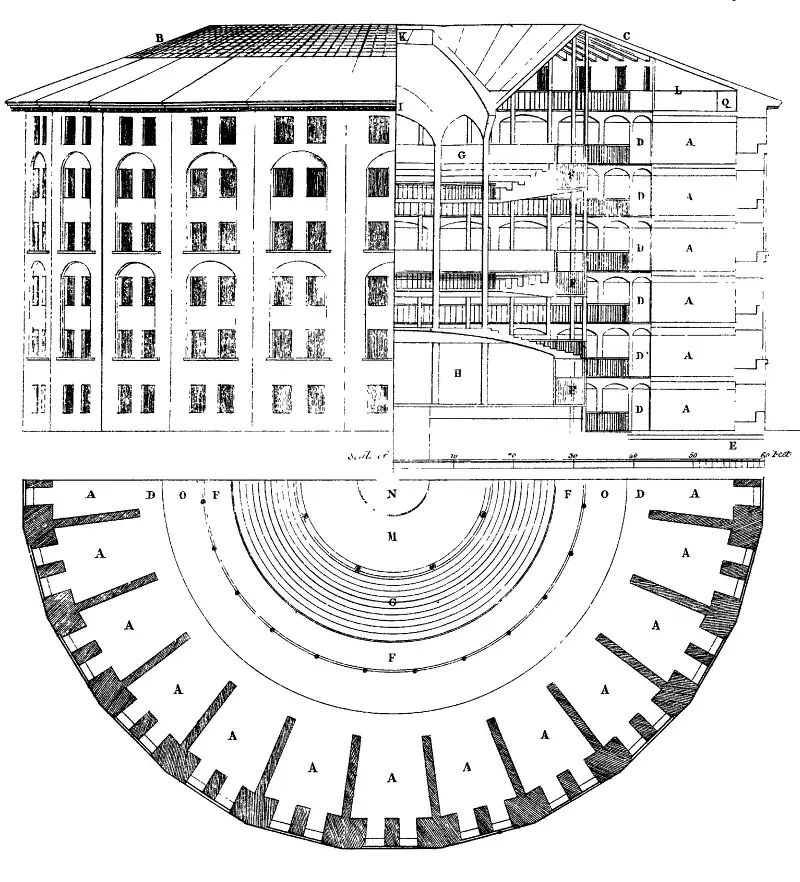Michel Foucault, a prominent French philosopher and social theorist, introduced the concept of the panopticon as a metaphor for modern disciplinary power. The panopticon, originally conceived by Jeremy Bentham, is a prison design that allows for constant surveillance of inmates. However, Foucault expanded the concept beyond its architectural origins and applied it to various aspects of society. This article will outline and explain Foucault’s thinking on the panopticon.
Origins of the Panopticon
The panopticon was initially proposed by Jeremy Bentham in the late 18th century as a prison design that would maximize surveillance and control over inmates. The central idea behind the panopticon is a circular building with a watchtower in the center, from which prison guards can observe all the cells surrounding it. The cells are arranged in a ring, facing the watchtower, making it impossible for the inmates to know when they are being watched. This constant uncertainty creates a sense of internalized discipline, as the prisoners modify their behavior to conform to the expectations of the watchful gaze.
Foucault’s Interpretation
Foucault saw the panopticon as a metaphor for the way power operates in modern society. He argued that the panopticon represents a disciplinary mechanism that is not limited to physical spaces like prisons but extends to various institutions and social practices. According to Foucault, the panopticon functions through the internalization of surveillance and self-regulation.
In Foucault’s view, the panopticon creates a power dynamic where those in positions of authority hold the power to observe and control, while those being observed internalize the disciplinary mechanisms and modify their behavior accordingly. This internalization of power leads to self-regulation, as individuals become their own wardens, constantly monitoring and disciplining themselves to conform to societal norms and expectations.
Application to Modern Society
Foucault believed that the panopticon metaphor can be applied to a wide range of social institutions and practices, including schools, hospitals, factories, and even our everyday lives. In these contexts, the panopticon operates through various forms of surveillance, such as CCTV cameras, biometric identification systems, and social media monitoring.
According to Foucault, the panopticon’s power lies not only in its ability to observe but also in its potential to induce a sense of constant visibility and the fear of being watched. This constant surveillance creates a disciplinary society where individuals regulate their behavior to avoid punishment or social exclusion. The panopticon, therefore, becomes a mechanism for social control and normalization.
Resistance and Alternatives
Foucault acknowledged the oppressive nature of the panopticon but also highlighted the potential for resistance and alternatives. He argued that the panopticon’s power is not absolute and can be challenged through acts of defiance and collective resistance.
Foucault proposed the idea of “counter-discipline” where individuals and communities develop strategies to subvert and resist the disciplinary mechanisms of the panopticon. This can be achieved through acts of non-conformity, disobedience, and the creation of alternative spaces and practices that challenge the dominant power structures.
Conclusion
Foucault’s thinking on the panopticon offers a critical perspective on the ways in which power operates in modern society. By expanding the concept beyond its architectural origins, Foucault demonstrates how the panopticon functions as a disciplinary mechanism that influences individual behavior and societal norms. Understanding the panopticon allows us to question and challenge the power dynamics that shape our lives and explore alternative forms of resistance and liberation.





